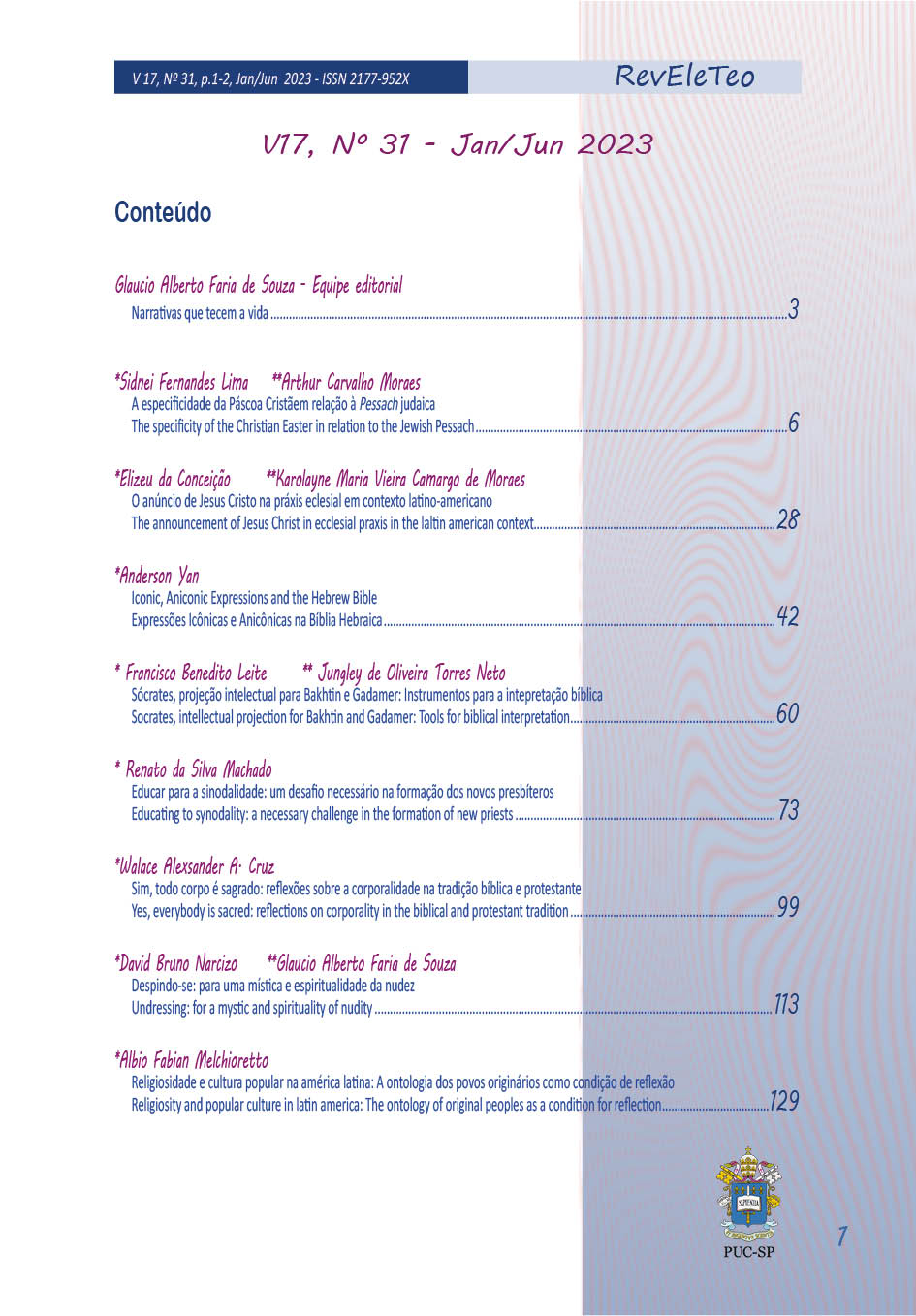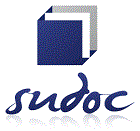Iconic, Aniconic Expressions and the Hebrew Bible
DOI:
https://doi.org/10.23925/2177-952X.2023v17i31p42-59Palabras clave:
Iconic, aniconic, embodiment, god(s), deity(ies).Resumen
This paper presents a critical evaluation of the assumption in Brazilian Protestant reading about issues involving iconic versus aniconic debate in the Hebrew Bible grounded on an external and internal evidence to trace the development towards formless Yahwism. It is argued that the understanding of this process contributes to a better understanding of the Christian reception of this literary corpus and the formulation of incarnation theology.
Citas
BARR, James. The Bible in the modern world. London: Student Christian Movement Press, 1973.
BECKING, Bob. The gods in whom they trusted… Assyrian evidence for iconic polytheism in ancient Israel? In: BECKING, Bob et al. (Org.). Only one god? Monotheism in ancient Israel and the veneration of the goddess Asherah. London and New York: Sheffield Academic Press, 2001, p. 151-63.
BECKING, Bob. The return of the deity: Iconic or aniconic? In: Amit, Yairah et al. (Org.). Essays on ancient Israel in its near Eastern context: A tribute to Nadav Na’aman. Winona Lake, IN: Eisenbrauns, 2006, p. 53-62.
BUBER, Martin. Königtum Gottes. 3rd ed. Heidelberg: Verlag Lambert Schneider, 1956.
BULTMANN, Rudolf. Ist voraussetzungslose Exegese möglich? In: Theologische Zeitschrift. Leipzig, v. 13, 1957, p. 409-17.
CHAVALAS, Mark W. The comparative use of ancient Near Eastern texts in the study of the Hebrew Bible. Religion compass. La Crosse, WI, v. 5, 2011, p. 150-65.
CONSTITUIÇÃO de 1824. Available in <http://www.planalto.gov.br/ccivil_03/constituicao/constituicao24.htm> [Accessed in: 05 de January 2020].
DAVIES, Philip R. Whose Bible is it anyway? Journal for the Study of the Old Testament Supplement Series 204. Sheffield: Sheffield Academic Press, 1995.
DAY, John. Yahweh and the gods and goddesses of Canaan. Journal for the Study of the Old Testament Supplement Series 265. Repr. London: Sheffield Academic Press, 2000.
DIETRICH, M. O. Loretz, and J. Sanmartín (Orgs.). The Cuneiform Alphabetic Text from Ugariti, Ras Ibn Hani and Other Places. KTU: 2nd ed. ALASPM 8. Munster: Ugarit-Verlag, 1995.
DIJKSTRA, Meindert. El, the God of Israel – Israel, the people of YHWH: On the origins of ancient Israelite Yahwism. In: BECKING, Bob et al. (Orgs.). Only one God? Monotheism in ancient Israel and the veneration of the goddess Asherah. London and New York: Sheffield Academic Press, 2001, p. 81-126.
EICHRODT, Walther. Vorsehungsglaube und Theodizee im Alten Testament. In: PROCKSCH, Otto, A. Alt et al. Festschrift Otto Procksch zum 60. Geburtstag am 9 August 1934. Leipzig: J. C. Hinrichs, 1934, p. 45-70.
PROCKSCH, Otto. Theologie des Alten Testaments: Gott und Volk. Vol. 1. Leipzig: J. C. Hinrichs’schen Buchhandlung, 1935.
ESLER, Philip F. The madness of Saul: A cultural reading of 1 Samuel 8–31. In: CHERYL, J. Cheryl and MOORE, Stephen D. (Orgs.). Biblical studies/cultural studies: The third Sheffield colloquium. Journal for the Study of the Old Testament Supplement Series 266. Sheffield: Sheffield Academic Press, 1998, p. 220-62.
FELEPPA, Robert. Emics, etics, and social objectivity. Current anthropology. Wichita, KS, v. 27, 1986, p. 249-51.
FINKELSTEIN, Israel. Migration of Israelites into Judah after 720 BCE: An answer and update. In: Zeitschrift für die alttestamentliche Wissenschaft. Tel Aviv, v. 127, 2015, p. 188-206.
GADAMER, Hans-Georg. Wahrheit und Methode: Grundzüge einer philosophischen Hermeneutik. Tübingen: J. C. B. Mohr (Paul Siebeck), 1990.
GERICKE, Jaco. The Hebrew Bible and philosophy of religion. The Society of Biblical Literature 70. Atlanta, GA: The Society of Biblical Literature, 2012.
GNUSE, Robert Karl. No other gods: Emergent monotheism in Israel. Journal for the Study of the Old Testament Supplement Series 241. Sheffield: Sheffield Academic Press, 1997.
GRABBE, Lester L. Ancient Israel: what do we know and how do we know it? 2a ed. London: Bloomsbury T&T Clark, 2017.
HALLO, William W. (Org.). The context of Scripture: Canonical compositions from the biblical world. Vol. 1. Leiden: Brill, 1997.
HAMORI, Esther J. ‘When gods were men’: The embodied god in biblical and ancient Near Eastern literature. Beihefte zur Zeitschrift für die alttestamentliche Wissenschaft 384. Berlin and New York: Walter de Gruyter, 2008.
HOFFNER, H. A. Theodicy in Hittite Texts. In: LAATO, Antti Laato and Johannes C. de Moor (Org.). Theodicy in the world of the Bible. Leiden and Boston, MA: Brill, 2003, p. 90-107.
JENSEN, Jeppe Sinding. Revisiting the insider-outsider debate: Dismantling a pseudo-problem in the study of religion. Method & theory in the study of religion. Aarhus, DK, v. 23, 2011, p. 29-47.
JOYCE, Paul. The Old Testament and its relationship to the New Testament. In: ROGERSON, John (Org.). Beginning Old Testament study. 2a ed. London: The Society for Promoting Christian Knowledge Press, 1998, p. 132-48.
KÖCKERT, Matthias. Suffering from formlessness: The ban on images in exilic times. In: BECKING, Bob and Dirk Human (eds.). Exile and suffering: A selection of papers read at the 50th anniversary meeting of the Old Testament society of South Africa OTWSA/OTSSA, Pretoria August 2007. Oudtestamentische Studïen 50. Leiden and Boston, MA: Brill, 2009, p. 33-49.
LANDSBERGER, Benno. Die Eigenbegrifflichkeit der babylonischen Welt. Islamica. Leipzig, v. 2, 1926, p. 355-72. Subsequently reprinted as LANDSBERGER, Benno and Wolfram Von Soden. Die Eigenbergrifflichkeit der babylonischen Welt. Vol. 142 of Libeli: Wissenschaftliche Buchgesellschaft. Darmstadt: Wissenschaftliche Buchgesellschaft, 1965.
LANG, Bernhard. Monotheism and the prophetic minority: An essay in biblical history and sociology. Social World of Biblical Antiquity Series 1. Sheffield: Almond Press, 1983.
LIND, Millard C. Yahweh is a warrior: The theology of warfare in ancient Israel. Scottdalle, PA and Kitchener, ON: Herald Press, 1980.
MACDONALD, Nathan. Aniconism in Old Testament. In: GORDON, R. P. (Org.). The God of Israel. University of Cambridge Oriental Publications 64. Cambridge: Cambridge University Press, 2007, p. 20-34.
MCCARTHY, Dennis J. Der Gottesbund im Alten Testament: Ein Bericht uber die Forschung der Letzten Jahre. Stuttgarter Bibelstudien 13. Stuttgart: Verlag Katholisches Bibelwerk GmbH, 1967.
MENDENHALL, George E. Ancient oriental and biblical law. Biblical Archaeology. Ann Arbor, MI: v. 17, 1954, p. 26-46.
MIDDLEMAS, Jill. The divine image: Prophetic aniconic rhetoric and its contribution to the aniconism debate. Forschungen zum Alten Testament 2 Reihe 74. Tübingen: Mohr Siebeck, 2014.
OLYAN, Saul M. The ascription of physical disability as stigmatising strategy in biblical iconic polemics. Journal of Hebrew Scriptures. Providence, RI, v. 9, 2009, p. 1-15. Subsequently republished in MOSS, Candida R. and Jeremy Schipper (Orgs.). Disability Studies and Biblical Literature. New York: Palgrave Macmillan, 2011, p. 89-102.
ORNAN, Tallay. The triumph of symbol: Pictorial representation of deities in Mesopotamia and the biblical image ban. Orbis Biblicus et Orientalis 213. Fribourg and Göttingen: Academic Press Fribourg and Vandenhoeck & Ruprecht Göttingen, 2005.
PIKE, Kenneth L. Language in relation to a unified theory of structure of human behavior. Vol. 1. Glendale, CA: Summer Institute of Linguistics, 1954.
RAMSEY, George W. The quest for the historical Israel. Louisville, KY and London: Westminster John Knox Press, 1981.
SCHMID, Konrad. Literaturgeschichte des Alten Testaments: Eine Einführung. Darmstadt: Wissenschaftliche Buchgesellschaft, 2008.
SCHMID, Konrad. Gibt es Theologie im Altem Testament? Zum Theologiebegriff in der alttestamentlichen Wissenschaft. Theologische Studien 7. Zürich: Theologischer Verlag, 2013.
SMITH, Mark S. The origins of biblical monotheism: Israel’s polytheistic background and the Ugaritic texts. Oxford: Oxford University Press, 2001, p. 32-33.
SMITH, Morton. Palestinian parties and politics that shaped the Old Testament. New York: Columbia University Press, 1971.
SOMMER, Benjamin. The bodies of God and the world of ancient Israel. Cambridge: Cambridge University Press, 2009.
STAATLICHE MUSEEN ZU BERLIN; Vorderasiatische Abteilung.; Deutsche Orient-Gesellschaft; Deutsche Akademie der Wissenschaften zu Berlin. Institut für Orientforschung. Keilschrifturkunden aus Boghazköi. Berlin: Akademia-Verlag, 1921.
ULIN, Robert C. Ulin. Beyond explanation and understanding: Anthropology and hermeneutics. Dialectical anthropology. Meadville, PA, v. 17, 1992, p. 253-69.
VON RAD, Gerhard. Das formgeschichtliche Problem des Hexateuch. Beiträge zur Wissenschaft vom Alten und Neuen Testament. Stuttgart, v. 4, 1938, p. 37-68. Subquently republished in VON RAD, Gerhard. Gesammelte Studien zum Alten Testament. Theologische Bücherei 8. München: Theologische Bücherei, 1958, p. 9-86.
VON RAD, Gerhard. Grundprobleme einer biblischen Theologie des Alten Testaments. Die Theologische Literaturzeitung. v. 9, 1943, p. 225-34.
WILKINGSON, Richard H. The complete gods and goddesses of ancient Egypt. London: Thames and Hudson, 2003.





